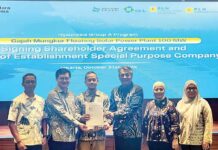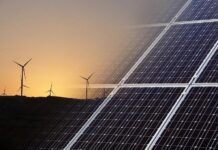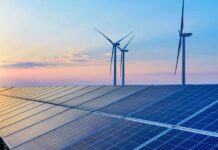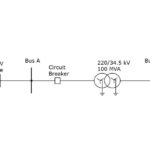
A few days back our Ministry of New and Renewable Energy (MNRE) has proudly declared that India’s Renewable Energy (RE) capacity has achieved a historic growth (29.52 GW) in FY 2024-25. In which the major expansion (23.83 GW) has happened in the field of solar energy. With the ministry’s utmost endeavour, our country is striding forward to attain its target of 500 GW of non-fossil fuel-based capacity by 2030.
In this journey, the role of our private sector solar component manufacturing companies has been quite significant. Definitely, their indomitable spirit has reached us to the position of the world’s third-largest producer of electricity from clean energy in 2024. In this regard, we have surpassed Germany – as reported in Ember’s sixth annual Global Electricity Review. Let us have a brief look today on the status quo (including recent activities) of a few of our progressive solar cell, panel and module companies involved in harnessing solar energy.
Avaada Group inaugurates its gigafactory
The journey of Avaada Group; a global leader in the clean energy transition, with expertise in solar module manufacturing, renewable power generation, and green hydrogen, green ammonia, and sustainable fuel production; started in 2009. Under the leadership of Vineet Mittal, the group is committed to driving India’s energy goals, including a target of 11 GWp renewable capacity by 2026. Avaada’s growth has been bolstered by a $1.3 billion investment in 2023 from Brookfield’s Energy Transition Fund and GPSC (a subsidiary of PTT Group, Thailand).
Recently, the Chief Minister of Uttar Pradesh, Yogi Adityanath has inaugurated its 1.5 GW Solar Module Manufacturing Gigafactory in Noida. Simultaneously, the foundation stone has been laid for Avaada Electro’s ambitious 5 GW Integrated Solar Manufacturing Unit at Ecotech, Greater Noida.
The 1.5 GW PV Module Manufacturing Unit in Dadri is a significant step in Avaada Group’s commitment to sustainable innovation. Constructed at an unprecedented pace, the first phase of the gigafactory became operational within just 3.5 months, with all utilities and module production lines fully commissioned.
The facility specializes in TOPCon N-Type bifacial glass-to-glass PV modules, incorporating advanced multi-bus bar configurations (16 to 24 bus bars) to maximize efficiency. With M10 and G12 cell production capabilities, the plant boasts an annual capacity of 1.2 GW for M10 modules and 1.5 GW for G12 modules, currently producing 5,800 modules daily. Each panel undergoes stringent quality checks to ensure reliability and peak performance.
With these developments, Avaada Group now continues to play a pivotal role in India’s clean energy transition, reinforcing its commitment to a sustainable, self-reliant future. By integrating technological innovation, advanced manufacturing, and a strong R&D focus, Avaada aims to transform India’s solar landscape while contributing significantly to the nation’s energy independence.
AGEL reaches a landmark
Being one of the largest renewable companies in India, with a Total Operational Renewable Portfolio of 14,242.9 MW, Adani Green Energy Limited (AGEL) is a part of the Adani Group’s promise to provide a better, cleaner and greener future for India. Driven by the group’s philosophy of ‘Growth with Goodness’, the company develops, builds, owns, operates and maintains utility-scale grid-connected solar and wind farm projects. The electricity generated is supplied to central and state government entities and government-backed corporations.
Towards the beginning of this running year, the company has set a new benchmark surpassing 12,000 MW Renewable Energy (RE) capacity. AGEL is the first and only renewable energy company in India to reach this landmark. AGEL’s 12,258.1 MW portfolio that consists of 8,347.5 MW solar, 1,651 MW wind and 2,259.6 MW wind-solar hybrid capacity.
The milestone underscores AGEL’s commitment to deliver 50,000 MW of clean, affordable and reliable power by 2030. The 12,258.1 MW operational portfolio will power more than 6.2 million homes and avoid about 22.64 million tonnes of CO2 emissions annually. The emissions avoided are equivalent to carbon sequestrated by 1,078 million trees.
A few notable points on AGEL’s contribution to India’s RE goals include: i) the largest greenfield expansion in India’s RE sector, ii) about 10% of India’s installed utility-scale solar and wind capacity, and iii) contribution of over 13% of India’s utility-scale solar installations.
AGEL is now developing the world’s largest renewable energy plant of 30,000 MW on the barren waste land at Khavda in Kutch, Gujarat. Built across 538 sq kms, it is five times the size of Paris and almost as large as Mumbai city. Once complete, it will be the planet’s largest power plant across all energy sources. AGEL has operationalized cumulative capacity of 2,824.1 MW renewable energy at Khavda so far. The accelerated progress at Khavda underscores AGEL’s commitment to India’s goal of 500 GW non-fossil fuel capacity by 2030.
Work at Khavda is continuing at a fast pace, with AGEL leveraging the project execution capabilities of Adani Infra, the manufacturing expertise of Adani New Industries Limited, the operational excellence of Adani Infrastructure Management Services Ltd. and the robust supply chain of its strategic partners.

TP Solar Limited is set to enhance employability
TP Solar Limited is the solar manufacturing arm of Tata Power – and a wholly owned subsidiary of Tata Power Renewable Energy Limited. The company has recently signed a Memorandum of Understanding (MoU) with Guidance Tamil Nadu and the DoTE (Directorate of Technical Education) to introduce the ‘Diploma in Renewable Energy’ course – a pioneering initiative designed to develop a skilled workforce for India’s fast-growing clean energy sector.
The innovative three-year programme will follow an ‘Earn While Learn’ model, offering students a unique blend of academic learning and extensive industry training.
Designed to enhance employability, it ensures students gain both theoretical knowledge and hands-on experience through a hybrid learning approach. Each year, students will spend three months in the classroom and nine months in practical training with industry experts, providing direct industry exposure. Additionally, students will receive a monthly stipend throughout the course, providing financial support while they develop essential skills for their careers.
The Diploma in Renewable Energy programme will commence in the academic year 2025-26 across select Government Polytechnic Colleges in Tamil Nadu. A total of 240 students will be admitted into the programme, in key districts in and around Tirunelveli, fostering regional skill development in clean energy technologies.
By bridging the gap between education and industry, this initiative sets a new benchmark in technical education. The ‘Diploma in Renewable Energy’ will empower a new generation of skilled professionals, accelerating India’s transition to a clean energy future.
Contextually, the parent company Tata Power has recently received approval from the Maharashtra Electricity Regulatory Commission (MERC) to install a 100 MW Battery Energy Storage System (BESS) in Mumbai over the next two years. The cutting-edge BESS, equipped with advanced ‘black start’ functionality, will enable a swift recovery of power supply to critical infrastructure, including the metro, hospitals, airport, and data centers, in case of grid disturbances. This will prevent large-scale blackouts and enhance Mumbai’s power network resilience. Additionally, the system’s sophisticated technology will optimize reactive power management, improving peak demand efficiency and strengthening the city’s power infrastructure.
WRTL to reinforce grid stability with cutting-edge solar technology
Waaree Renewable Technologies Ltd. (WRTL) has recently been awarded a Letter of Award (LoA) for the execution of a ground-mounted solar power project with an installed capacity of 170 MW AC / 255 MW DC. The project, valued at approximately `232.30 crore, will be executed on a turnkey basis, covering comprehensive Engineering, Procurement, and Construction (EPC) services, along with long-term Operation & Maintenance (O&M).
Beyond its scale and technological advancements, the project will contribute significantly to carbon offset efforts, reducing an estimated 225,000 metric tons of CO2 emissions annually – the equivalent of removing nearly 50,000 fossil fuel-powered cars from the roads each year.
With this project, WRTL will expand its footprint in enabling India’s energy self-sufficiency, reducing dependence on fossil fuels while reinforcing grid stability with cutting-edge solar technology.
This initiative aligns with the nation’s decarbonisation strategy and the government’s commitment to scaling domestic renewable infrastructure at an unprecedented pace. With solar at the heart of the country’s ambition to achieve 500 GW of renewable capacity by 2030, large-scale projects like this will play a pivotal role in accelerating the transition to a low-carbon future.
Epilogue
Although clean power sources include solar, wind, geothermal, bio-energy etc., as being seen globally, in India also the growth of solar power industry is much faster than other clean energy segments.
There are many other players in this field (not included here) in our sub-continent; such as Goldi Solar, Premier Energies, Saatvik Green Energy, Vikram Solar, Gensol Engineering, RenewSys, Jakson Solar, and Loom Solar. All of them are not only focused on project handling but also equally paying attention on manufacturing indigenous solar power components, which is very essential for our country’s self-sufficiency.
Most of our prominent solar power companies have already established themselves in the international markets too.
By P. K. Chatterjee (PK)



















